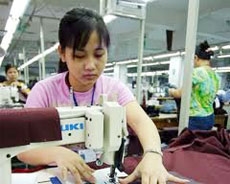Loss of sweeteners to leave a bitter taste
 Minh Chau garment company director Nguyen My Linh is one of many local company chiefs anxious about the removal of incentives.
Minh Chau garment company director Nguyen My Linh is one of many local company chiefs anxious about the removal of incentives.
Linh said the company invested $2 million to build a garment factory at Nhi Xuan-Hoc Mon Industrial Zone, in Ho Chi Minh City’s District 12 in 2007.
Because of its policies on using workers having beaten drug addiction, the firm received a preferential loan for 10 years commited by the zone’s management board.
However, Hoc Mon district authorities in February, 2009 suddenly stopped the loan interest incentive, in line with Vietnam’s World Trade Organization (WTO) commitments, which regulate that such subsidies were not allowed in the garment sector.
When 70 per cent of the factory was completed, the firm faced big debts due to increasing interest rate. Linh said her firm might have to sell the factory to pay debts or sue state bodies for its breaking commitment.
“I do not understand why the state bodies knew WTO’s commitments, but they still gave us preferential interest rate for 10 years,” she lamented.
Hironita Nakanishi, senior advisor of Jetro Ho Chi Minh City, said he also wondered about Japanese firms within export processing industrial zones if the Vietnamese government’s corporate income tax incentives ended by 2012.
It means that Vietnam must choose one of two options; to implement its WTO commitments or keep promises on incentives to foreign investors.
“This is a quite difficult choice because Vietnam has to ensure both meeting with WTO’s commitments, maintaining partial commitments with investors as well as ensuring the attractiveness and competitiveness of Vietnam investment environment in the future,” said Dang Xuan Quang, deputy director of Ministry of Planning and Investment’s (MPI) Foreign Investment Agency.
Deputy director of the MPI’s legislature department Tran Hao Hung said the state bodies including the ministries of Finance, and Trade and Industry and enterprises would discuss solutions.
Hung said Vietnam could apply other incentives to replace preferential taxes for investors such as land incentives, preferential procedures or allowing firms in export processing zones to sell their products on the domestic market.
“In the case of Minh Chau, the draft decree replacing Decree 108 implementing the Investment Law will add one more regulation of a firm using labor after beating drug addiction into list of firms who will receive preferential taxes,” Hung told Linh.
The decree draft would be submitted to the government for approval in 2011, said Hung.
What the stars mean:
★ Poor ★ ★ Promising ★★★ Good ★★★★ Very good ★★★★★ Exceptional
Latest News
More News
- Site clearance work launched for Dung Quat refinery upgrade (February 04, 2026 | 18:06)
- Masan High-Tech Materials reports profit: a view from Nui Phao mine (February 04, 2026 | 16:13)
- Hermes joins Long Thanh cargo terminal development (February 04, 2026 | 15:59)
- SCG enhances production and distribution in Vietnam (February 04, 2026 | 08:00)
- UNIVACCO strengthens Asia expansion with Vietnam facility (February 03, 2026 | 08:00)
- Cai Mep Ha Port project wins approval with $1.95bn investment (February 02, 2026 | 16:17)
- Repositioning Vietnam in Asia’s manufacturing race (February 02, 2026 | 16:00)
- Manufacturing growth remains solid in early 2026 (February 02, 2026 | 15:28)
- Navigating venture capital trends across the continent (February 02, 2026 | 14:00)
- Motivations to achieve high growth (February 02, 2026 | 11:00)
















 Mobile Version
Mobile Version